Effects of working memory training on cognitive and academic abilities in typically developing school-age children
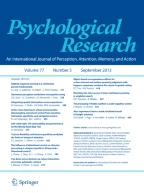
Process-based working memory (WM) training in typically developing children usually leads to short- and long-term improvements on untrained WM tasks. However, results are mixed regarding far transfer to academic and cognitive abilities. Moreover, there is a lack of studies jointly evaluating the different types of transfer, using an adequate design and considering motivational factors. In addition, evidence is needed about how pre-training performance is related to individual differences in training-induced transfer. Therefore, this study aimed to implement and evaluate the efficacy of a computerized process-based WM training in typically developing school-age children. Near and far transfer effects were evaluated both immediately after training and after 6 months, as well as individual differences in training-induced transfer. The sample was composed of 89 typically developing children aged 9–10 years (M = 9.52, SD = 0.30), who were randomized to a WM training group or an active control group. They were evaluated at pre-training, post-training, and follow-up phases with measures of visuospatial and verbal WM, reading comprehension, math computation, and fluid intelligence. Results showed that the training group significantly improved performance in verbal WM and fluid intelligence compared to the active control group, immediately after training and after 6 months. Trained children with lower initial performance in verbal WM or fluid intelligence showed greater transfer gains. No group differences were found in motivational factors. Findings of this study suggest that process-based WM training may promote transfer to cognitive abilities and lead to compensation effects of individual differences in typically developing school-age children.
This is a preview of subscription content, log in via an institution to check access.
Access this article
Subscribe and save
Springer+ Basic
€32.70 /Month
- Get 10 units per month
- Download Article/Chapter or eBook
- 1 Unit = 1 Article or 1 Chapter
- Cancel anytime
Buy Now
Price includes VAT (France)
Instant access to the full article PDF.
Rent this article via DeepDyve
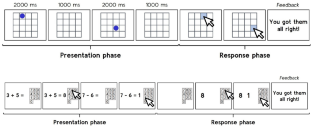
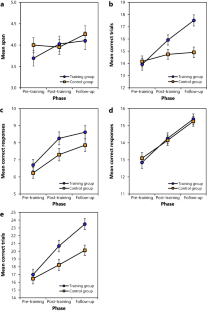
Similar content being viewed by others
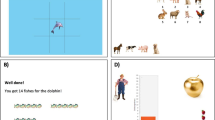
Effects of Working Memory Training on Children’s Memory and Academic Performance: the Role of Training Task Features and Trainee’s Characteristics
Article Open access 26 April 2022
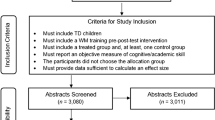
Working memory training in typically developing children: A multilevel meta-analysis
Article 14 January 2020
Effect of working memory training on working memory, arithmetic and following instructions
Article 27 September 2014
Data availability
The data supporting the results of this review are available from the corresponding author upon reasonable request.
Code availability
Notes
It may be possible that by using an average score, differences between groups in any of the Intrinsic Motivation Inventory dimensions might have been balanced out. Thus, additional t-tests were run separately on the scores of each dimension to check for differences between the training group and active control group. Results suggest no significant differences between groups in children from the initial sample: interest/enjoyment, t (87) = 0.015, p = .988, d = 0.003; perceived competence, t (77.55) = 1.014, p = .314, d = 0.214; effort/importance, t (74.94) = 1.600, p = .114, d = 0.335; as well as in children that participated in all the assessment phases of the study: interest/enjoyment, t (80) = 0.234, p = .815, d = 0.052; perceived competence, t (69.77) = 0.471, p = .639, d = 0.105; effort/importance, t (70.71) = 1.577, p = .119, d = 0.388.
References
- Abusamra, V., Ferreres, A., Raiter, A., De Beni, R., & Cornoldi, C. (2010). Test Leer para Comprender TLC: Evaluación de la comprensión de textos. Paidós. Google Scholar
- Alloway, T. P., Bibile, V., & Lau, G. (2013). Computerized working memory training: Can it lead to gains in cognitive skills in students? Computers in Human Behavior,29(3), 632–638. https://doi.org/10.1016/j.chb.2012.10.023ArticleGoogle Scholar
- Alloway, T. P., & Copello, E. (2013). Working memory: The what, the why, and the how. The Australian Educational and Developmental Psychologist,30(2), 105–118. https://doi.org/10.1017/edp.2013.13ArticleGoogle Scholar
- Alloway, T. P., Gathercole, S. E., & Pickering, S. J. (2006). Verbal and visuospatial short-term and working memory in children: Are they separable? Child Development,77(6), 1698–1716. https://doi.org/10.1111/j.1467-8624.2006.00968.xArticleGoogle Scholar
- Andrés, M. L., Stelzer, F., Vernucci, S., Canet-Juric, L., Galli, J. I., & Navarro Guzmán, J. I. (2017). Regulación emocional y habilidades académicas: Relación en niños de 9 a 11 años de edad. Suma Psicologica,24(2), 79–86. https://doi.org/10.1016/j.sumpsi.2017.07.001ArticleGoogle Scholar
- Appelgren, A., Bengtsson, S. L., & Söderqvist, S. (2016). Incremental view on intelligence and high intrinsic motivation increase working memory training compliance. Applied Cognitive Psychology,30(2), 289–293. https://doi.org/10.1002/acp.3184ArticleGoogle Scholar
- Baddeley, A. D. (2012). Working memory: Theories, models, and controversies. Annual Review of Psychology,63, 1–29. https://doi.org/10.1146/annurev-psych-120710-100422ArticleGoogle Scholar
- Barnett, S. M., & Ceci, S. J. (2002). When and where do we apply what we learn?: A taxonomy for far transfer. Psychological Bulletin,128(4), 612–637. https://doi.org/10.1037/0033-2909.128.4.612ArticleGoogle Scholar
- Bergman Nutley, S., Söderqvist, S., Bryde, S., Thorell, L. B., Humphreys, K., & Klingberg, T. (2011). Gains in fluid intelligence after training non-verbal reasoning in 4-year-old children: A controlled, randomized study. Developmental Science,14(3), 591–601. https://doi.org/10.1111/j.1467-7687.2010.01022.xArticleGoogle Scholar
- Best, J. R., Miller, P. H., & Naglieri, J. A. (2011). Relations between executive function and academic achievement from ages 5 to 17 in a large, representative national simple. Learning and Individual Differences,21(4), 327–336. https://doi.org/10.1016/j.lindif.2011.01.007ArticleGoogle Scholar
- Blackwell, L. S., Trzesniewski, K. H., & Dweck, C. S. (2007). Implicit theories of intelligence predict achievement across an adolescent transition: A longitudinal study and an intervention. Child Development,78(1), 246–263. https://doi.org/10.1111/j.1467-8624.2007.00995.xArticleGoogle Scholar
- Blakey, E., & Carroll, D. J. (2015). A short executive function training program improves working memory in preschoolers. Frontiers in Psychology. https://doi.org/10.3389/fpsyg.2015.01827ArticleGoogle Scholar
- Boot, W. R., Simons, D. J., Stothart, C., & Stutts, C. (2013). The pervasive problem with placebos in psychology: Why active control groups are not sufficient to rule out placebo effects. Perspectives on Psychological Science,8(4), 445–454. https://doi.org/10.1177/1745691613491271ArticleGoogle Scholar
- Borella, E., & de Ribaupierre, A. (2014). The role of working memory, inhibition, and processing speed in text comprehension in children. Learning and Individual Differences,34, 86–92. https://doi.org/10.1016/j.lindif.2014.05.001ArticleGoogle Scholar
- Bull, R., & Lee, K. (2014). Executive functioning and mathematics achievement. Child Development Perspectives,8(1), 36–41. https://doi.org/10.1111/cdep.12059ArticleGoogle Scholar
- Campos, I. S., Almeida, L. S., Ferreira, A. I., & Martinez, L. F. (2013). Working memory as separable subsystems: A study with Portuguese primary school children. Spanish Journal of Psychology,16, E14. https://doi.org/10.1017/sjp.2013.6ArticleGoogle Scholar
- Canet-Juric, L., Stelzer, F., Andrés, M. L., Vernucci, S., Introzzi, I., & Burin, D. I. (2018). Evidencias de validez de una tarea computarizada de memoria de trabajo verbal y viso-espacial para niños. Revista Interamericana De Psicología/interamerican Journal of Psychology,52(1), 112–128. Google Scholar
- Canet-Juric, L., Burin, D. I., Andrés, M. L., & Urquijo, S. (2013). Perfil cognitivo de niños con rendimientos bajos en comprensión lectora. Anales De Psicología,29(3), 996–1005. https://doi.org/10.6018/analesps.29.3.138221ArticleGoogle Scholar
- Cardoso, C. de O., Dias, N., Senger, J., Colling, A. P. C., Seabra, A. G., & Fonseca, R. P. (2018). Neuropsychological stimulation of executive functions in children with typical development: A systematic review. Applied Neuropsychology: Child,7(1), 61–81. https://doi.org/10.1080/21622965.2016.1241950ArticleGoogle Scholar
- Center for Self-Determination Theory (n.d.). Intrinsic Motivation Inventory (IMI). Retrieved March 19, 2021, from http://selfdeterminationtheory.org/intrinsic-motivation-inventory/
- Cohen, J. (1988). Statistical power analysis for the behavioral sciences (2nd ed.). Lawrence Erlbaum Associates. Google Scholar
- Conway, A. R. A., Jarrold, C., Kane, M. J., Miyake, A., & Towse, J. N. (2007). Variation in working memory: An introduction. In A. R. A. Conway, C. Jarrold, M. J. Kane, A. Miyake, & J. N. Towse (Eds.), Variation in working memory (pp. 3–17). Oxford University Press. Google Scholar
- Conway, A. R. A., Kane, M. J., Bunting, M. F., Hambrick, D. Z., Wilhelm, O., & Engle, R. W. (2005). Working memory span tasks: A methodological review and user’s guide. Psychonomic Bulletin & Review,12(5), 769–786. https://doi.org/10.3758/bf03196772ArticleGoogle Scholar
- Cragg, L., Keeble, S., Richardson, S., Roome, H. E., & Gilmore, C. (2017). Direct and indirect influences of executive functions on mathematics achievement. Cognition,162, 12–26. https://doi.org/10.1016/j.cognition.2017.01.014ArticleGoogle Scholar
- Cragg, L., & Gilmore, C. (2014). Skills underlying mathematics: The role of executive function in the development of mathematics proficiency. Trends in Neuroscience and Education, 3(2), 63–68. https://doi.org/10.1016/j.tine.2013.12.001. ArticleGoogle Scholar
- Cumming, G. (2012). Understanding the new statistiscs: Effect sizes, confidence intervals, and meta-analysis. Routledge. Google Scholar
- Dehn, M. J. (2017). How working memory enables fluid reasoning. Applied Neuropsychology: Child,6(3), 245–247. https://doi.org/10.1080/21622965.2017.1317490ArticleGoogle Scholar
- Diamond, A., & Ling, D. S. (2016). Conclusions about interventions, programs, and approaches for improving executive functions that appear justified and those that, despite much hype, do not. Developmental Cognitive Neuroscience,18, 34–48. https://doi.org/10.1016/j.dcn.2015.11.005ArticleGoogle Scholar
- Dörrenbächer, S., Müller, P. M., Tröger, J., & Kray, J. (2014). Dissociable effects of game elements on motivation and performance in a cognitive-control training in middle childhood. Frontiers in Psychology. https://doi.org/10.3389/fpsyg.2014.01275ArticleGoogle Scholar
- Dweck, C. S. (2006). Mindset: The new psychology of success. Ballantine Books. Google Scholar
- Dweck, C. S. (2000). Self-theories: Their role in motivation, personality, and development. Psychology Press. Google Scholar
- Dweck, C. S., & Yeager, D. S. (2019). Mindsets: A view from two eras. Perspectives on Psychological Science,14(3), 481–496. https://doi.org/10.1177/1745691618804166ArticleGoogle Scholar
- Engel de Abreu, P. M. J., Conway, A. R. A., & Gathercole, S. E. (2010). Working memory and fluid intelligence in young children. Intelligence,38(6), 552–561. https://doi.org/10.1016/j.intell.2010.07.003ArticleGoogle Scholar
- Faul, F., Erdfelder, E., Lang, A.-G., & Buchner, A. (2007). G*Power 3: A flexible statistical power analysis program for the social, behavioral, and biomedical sciences. Behavior Research Methods,39(2), 175–191. https://doi.org/10.3758/BF03193146ArticleGoogle Scholar
- Ferrer, E., O’Hare, E. D., & Bunge, S. A. (2009). Fluid reasoning and the developing brain. Frontiers in Neuroscience,3(1), 46–51. https://doi.org/10.3389/neuro.01.003.2009ArticleGoogle Scholar
- Field, A. (2013). Discovering statistics using IBM SPSS Statistics (4th ed.). Sage. Google Scholar
- Follmer, D. J. (2018). Executive function and reading comprehension: A meta-analytic review. Educational Psychologist,53(1), 42–60. https://doi.org/10.1080/00461520.2017.1309295ArticleGoogle Scholar
- Friso-van den Bos, I., van der Ven, S. H. G., Kroesbergen, E. H., & van Luit, J. E. H. (2013). Working memory and mathematics in primary school children: A meta-analysis. Educational Research Review,10, 29–44. https://doi.org/10.1016/j.edurev.2013.05.003ArticleGoogle Scholar
- George, D., & Mallery, P. (2016). IBM SPSS statistics 23 step by step (14th ed.). Routledge. BookGoogle Scholar
- Giofrè, D., Mammarella, I. C., & Cornoldi, C. (2013). The structure of working memory and how it relates to intelligence in children. Intelligence,41(5), 396–406. https://doi.org/10.1016/j.intell.2013.06.006ArticleGoogle Scholar
- Gray, S., Green, S., Alt, M., Hogan, T., Kuo, T., Brinkley, S., & Cowan, N. (2017). The structure of working memory in young children and its relation to intelligence. Journal of Memory and Language,92, 183–201. https://doi.org/10.1016/j.jml.2016.06.004ArticleGoogle Scholar
- Green, C. S., Bavelier, D., Kramer, A. F., Vinogradov, S., Ansorge, U., Ball, K. K., Bingel, U., Chein, J. M., Colzato, L. S., Edwards, J. D., Facoetti, A., Gazzaley, A., Gathercole, S. E., Ghisletta, P., Gori, S., Granic, I., Hillman, C. H., Hommel, B., Jaeggi, S. M., . Witt, C. M. (2019). Improving methodological standards in behavioral interventions for cognitive enhancement. Journal of Cognitive Enhancement,3(1), 2–29. https://doi.org/10.1007/s41465-018-0115-yArticleGoogle Scholar
- Green, C. S., Strobach, T., & Schubert, T. (2014). On methodological standards in training and transfer experiments. Psychological Research Psychologische Forschung,78(6), 756–772. https://doi.org/10.1007/s00426-013-0535-3ArticleGoogle Scholar
- Haimovitz, K., & Dweck, C. S. (2017). The origins of children’s growth and fixed mindsets: New research and a new proposal. Child Development,88(6), 1849–1859. https://doi.org/10.1111/cdev.12955ArticleGoogle Scholar
- Hale, S., Bronik, M. D., & Fry, A. F. (1997). Verbal and spatial working memory in school-age children: Developmental differences in susceptibility to interference. Developmental Psychology,33(2), 364–371. https://doi.org/10.1037/0012-1649.33.2.364ArticleGoogle Scholar
- Hale, S., Myerson, J., Emery, L. J., Lawrence, B. M., & DuFault, C. (2007). Variation in working memory across the life span. In A. R. A. Conway, C. Jarrold, M. J. Kane, A. Miyake, & J. N. Towse (Eds.), Variation in working memory (pp. 194–224). Oxford University Press. Google Scholar
- Hedges, L. V., & Olkin, I. (1985). Statistical methods for meta-analysis. Academic Press. Google Scholar
- Hitchcock, C., & Westwell, M. S. (2016). A cluster-randomised, controlled trial of the impact of Cogmed working memory training on both academic performance and regulation of social, emotional and behavioural challenges. Journal of Child Psychology and Psychiatry,58(2), 140–150. https://doi.org/10.1111/jcpp.12638ArticleGoogle Scholar
- Hobeika, L., Diard-Detoeuf, C., Garcin, B., Levy, R., & Volle, E. (2016). General and specialized brain correlates for analogical reasoning: A meta-analysis of functional imaging studies. Human Brain Mapping,37(5), 1953–1969. https://doi.org/10.1002/hbm.23149ArticleGoogle Scholar
- Hollingshead, A. B. (2011). Four factor index of social status. Yale Journal of Sociology,8, 21–52. Google Scholar
- Injoque-Ricle, I., Calero, A. D., Alloway, T. P., & Burin, D. I. (2011). Assessing working memory in Spanish-speaking children: Automated Working Memory Assessment battery adaptation. Learning and Individual Differences,21(1), 78–84. https://doi.org/10.1016/j.lindif.2010.09.012ArticleGoogle Scholar
- Jaeggi, S. M., & Buschkuehl, M. (2014). Working memory training and transfer: Theoretical and practical considerations. In B. Toni (Ed.), New Frontiers of Multidisciplinary Research in STEAM-H (Science, Technology, Engineering, Agriculture, Mathematics, and Health) (pp. 19–43). Springer. ChapterGoogle Scholar
- Jaeggi, S. M., Buschkuehl, M., Jonides, J., & Shah, P. (2011). Short- and long-term benefits of cognitive training. Proceedings of the National Academy of Sciences of the United States of America,108(25), 10081–10086. https://doi.org/10.1073/pnas.1103228108ArticleGoogle Scholar
- Jaeggi, S. M., Buschkuehl, M., Shah, P., & Jonides, J. (2014). The role of individual differences in cognitive training and transfer. Memory & Cognition,42(3), 464–480. https://doi.org/10.3758/s13421-013-0364-zArticleGoogle Scholar
- Johann, V. E., & Karbach, J. (2020). Effects of game-based and standard executive control training on cognitive and academic abilities in elementary school children. Developmental Science,23(4), 1–18. https://doi.org/10.1111/desc.12866ArticleGoogle Scholar
- Jolles, D. D., & Crone, E. A. (2012). Training the developing brain: A neurocognitive perspective. Frontiers in Human Neuroscience. https://doi.org/10.3389/fnhum.2012.00076ArticleGoogle Scholar
- Karbach, J., & Unger, K. (2014). Executive control training from middle childhood to adolescence. Frontiers in Psychology. https://doi.org/10.3389/fpsyg.2014.00390ArticleGoogle Scholar
- Karbach, J., Könen, T., & Spengler, M. (2017). Who benefits the most? Individual differences in the transfer of executive control training in younger and older adults. Journal of Cognitive Enhancement,1(4), 394–405. https://doi.org/10.1007/s41465-017-0054-zArticleGoogle Scholar
- Karbach, J., Strobach, T., & Schubert, T. (2015). Adaptive working-memory training benefits reading, but not mathematics in middle childhood. Child Neuropsychology,21(3), 285–301. https://doi.org/10.1080/09297049.2014.899336ArticleGoogle Scholar
- Katz, B., Jones, M. R., Shah, P., Buschkuehl, M., & Jaeggi, S. M. (2016). Individual differences and motivational effects. In T. Strobach & J. Karbach (Eds.), Cognitive training: An overview of features and applications (pp. 157–166). Springer. ChapterGoogle Scholar
- Klingberg, T. (2010). Training and plasticity of working memory. Trends in Cognitive Sciences,14(7), 317–324. https://doi.org/10.1016/j.tics.2010.05.002ArticleGoogle Scholar
- Könen, T., Strobach, T., & Karbach, J. (2016). Working memory. In T. Strobach & J. Karbach (Eds.), Cognitive training: An overview of features and applications (pp. 59–68). Springer. ChapterGoogle Scholar
- Kray, J., & Ferdinand, N. K. (2013). How to improve cognitive control in development during childhood: Potentials and limits of cognitive interventions. Child Development Perspectives,7(2), 121–125. https://doi.org/10.1111/cdep.12027ArticleGoogle Scholar
- Lakens, D. (2013). Calculating and reporting effect sizes to facilitate cumulative science: A practical primer for t-tests and ANOVAs. Frontiers in Psychology. https://doi.org/10.3389/fpsyg.2013.00863ArticleGoogle Scholar
- Loosli, S. V., Buschkuehl, M., Perrig, W. J., & Jaeggi, S. M. (2012). Working memory training improves reading processes in typically developing children. Child Neuropsychology,18(1), 62–78. https://doi.org/10.1080/09297049.2011.575772ArticleGoogle Scholar
- Mansur-Alves, M., Flores-Mendoza, C., & Tierra-Criollo, C. J. (2013). Evidências preliminares da efetividade do treinamento cognitivo para melhorar a inteligência de crianças escolares. Psicologia: Reflexão e Crítica,26(3), 423–434. Google Scholar
- Mansur-Alves, M., & Flores-Mendoza, C. (2015). Working memory training does not improve intelligence: Evidence from brazilian children. Psicologia: Reflexão e Crítica,28(3), 474–482. https://doi.org/10.1590/1678-7153.201528306ArticleGoogle Scholar
- McAuley, E., Duncan, T., & Tammen, V. V. (1989). Psychometric properties of the Intrinsic Motivation Inventory in a competitive sport setting: A confirmatory factor analysis. Research Quarterly for Exercise and Sport,60(1), 48–58. https://doi.org/10.1080/02701367.1989.10607413ArticleGoogle Scholar
- McGrew, K. S. (2009). CHC theory and the human cognitive abilities project: Standing on the shoulders of the giants of psychometric intelligence research. Intelligence,37(1), 1–10. https://doi.org/10.1016/j.intell.2008.08.004ArticleGoogle Scholar
- Melby-Lervåg, M., Redick, T., & Hulme, C. (2016). Working memory training does not improve performance on measures of intelligence or other measures of “far transfer”: Evidence from a meta-analytic review. Perspectives on Psychological Science,11(4), 512–534. https://doi.org/10.1177/1745691616635612ArticleGoogle Scholar
- Moreau, D., Kirk, I. J., & Waldie, K. E. (2016). Seven pervasive statistical flaws in cognitive training interventions. Frontiers in Human Neuroscience. https://doi.org/10.3389/fnhum.2016.00153ArticleGoogle Scholar
- Morrison, A. B., & Chein, J. M. (2011). Does working memory training work? The promise and challenges of enhancing cognition by training working memory. Psychonomic Bulletin & Review,18(1), 46–60. https://doi.org/10.3758/s13423-010-0034-0ArticleGoogle Scholar
- Motter, J. N., Devanand, D. P., Doraiswamy, P. M., & Sneed, J. R. (2016). Clinical trials to gain FDA approval for computerized cognitive training: What is the ideal control condition? Frontiers in Aging Neuroscience. https://doi.org/10.3389/fnagi.2016.00249ArticleGoogle Scholar
- Pascual, L., Galperín, C. Z., & Bornstein, M. H. (1993). La medición del nivel socioeconómico y la psicología evolutiva: El caso argentino. Revista Interamericana De Psicología/interamerican Journal of Psychology,27(1), 59–74. Google Scholar
- Peng, P., Barnes, M., Wang, C., Wang, W., Li, S., Swanson, H. L., Dardick, W., & Tao, S. (2018). A meta-analysis on the relation between reading and working memory. Psychological Bulletin,144(1), 48–76. https://doi.org/10.1037/bul0000124ArticleGoogle Scholar
- Peng, P., Namkung, J., Barnes, M., & Sun, C. (2016). A meta-analysis of mathematics and working memory: Moderating effects of working memory domain, type of mathematics skill, and sample characteristics. Journal of Educational Psychology,108(4), 455–473. https://doi.org/10.1037/edu0000079ArticleGoogle Scholar
- Raghubar, K. P., Barnes, M. A., & Hecht, S. A. (2010). Working memory and mathematics: A review of developmental, individual difference, and cognitive approaches. Learning and Individual Differences,20(2), 110–122. https://doi.org/10.1016/j.lindif.2009.10.005ArticleGoogle Scholar
- Rapport, M. D., Orban, S. A., Kofler, M. J., & Friedman, L. M. (2013). Do programs designed to train working memory, other executive functions, and attention benefit children with ADHD? A meta-analytic review of cognitive, academic, and behavioral outcomes. Clinical Psychology Review,33(8), 1237–1252. https://doi.org/10.1016/j.cpr.2013.08.005ArticleGoogle Scholar
- Redick, T. S., & Lindsey, D. R. B. (2013). Complex span and n-back measures of working memory: A meta-analysis. Psychonomic Bulletin & Review,20(6), 1102–1113. https://doi.org/10.3758/s13423-013-0453-9ArticleGoogle Scholar
- Redick, T. S., Shipstead, Z., Wiemers, E. A., Melby-Lervåg, M., & Hulme, C. (2015). What’s working in working memory training? An Educational Perspective. Educational Psychology Review,27(4), 617–633. https://doi.org/10.1007/s10648-015-9314-6ArticleGoogle Scholar
- Rode, C., Robson, R., Purviance, A., Geary, D. C., & Mayr, U. (2014). Is working memory training effective? A study in a school setting. PLoS ONE,9(8), e104796. https://doi.org/10.1371/journal.pone.0104796ArticleGoogle Scholar
- Rueda, M. R., Cómbita, L. M., & Pozuelos, J. P. (2016). Childhood and adolescence. In T. Strobach & J. Karbach (Eds.), Cognitive training: An overview of features and applications (pp. 33–44). Springer. ChapterGoogle Scholar
- Ryan, R. M., & Deci, E. L. (2000). Intrinsic and extrinsic motivations: Classic definitions and new directions. Contemporary Educational Psychology,25(1), 54–67. https://doi.org/10.1006/ceps.1999.1020ArticleGoogle Scholar
- Sala, G., & Gobet, F. (2017). Working memory training in typically developing children: A meta-analysis of the available evidence. Developmental Psychology,53(4), 671–685. https://doi.org/10.1037/dev0000265ArticleGoogle Scholar
- Sala, G., & Gobet, F. (2019). Cognitive training does not enhance general cognition. Trends in Cognitive Sciences,23(1), 9–20. https://doi.org/10.1016/j.tics.2018.10.004ArticleGoogle Scholar
- Sánchez-Pérez, N., Castillo, A., López-López, J. A., Pina, V., Puga, J. L., Campoy, G., González-Salinas, C., & Fuentes, L. J. (2018). Computer-based training in math and working memory improves cognitive skills and academic achievement in primary school children: Behavioral results. Frontiers in Psychology. https://doi.org/10.3389/fpsyg.2017.02327ArticleGoogle Scholar
- Sautú, R. (1989). Teoría y técnica en la medición del status ocupacional: Escalas objetivas de prestigio (Working document). Universidad de Buenos Aires. Google Scholar
- Schmiedek, F. (2016). Methods and designs. In T. Strobach & J. Karbach (Eds.), Cognitive training: An overview of features and applications (pp. 9–18). Springer. ChapterGoogle Scholar
- Shadish, W. R., Cook, T. D., & Campbell, D. T. (2002). Experimental and quasi-experimental designs for generalized causal inference. Houghton Mifflin. Google Scholar
- Shipstead, Z., Redick, T. S., & Engle, R. W. (2012). Is working memory training effective? Psychological Bulletin,138(4), 628–654. https://doi.org/10.1037/a0027473ArticleGoogle Scholar
- Smid, C. R., Karbach, J., & Steinbeis, N. (2020). Toward a science of effective cognitive training. Current Directions in Psychological Science,29(6), 531–537. https://doi.org/10.1177/0963721420951599ArticleGoogle Scholar
- Snelbaker, A. J., Wilkinson, G. S., Robertson, G. J., & Glutting, J. J. (2001). Wide Range Achievement Test 3 (WRAT3). In W. I. Dorfman & M. Hersen (Eds.), Understanding psychological assessment (pp. 259–274). Springer. ChapterGoogle Scholar
- Söderqvist, S., & Bergman Nutley, S. (2015). Working memory training is associated with long term attainments in math and reading. Frontiers in Psychology. https://doi.org/10.3389/fpsyg.2015.01711ArticleGoogle Scholar
- Swanson, H. L., & Alloway, T. P. (2012). Working memory, learning, and academic achievement. In K. R. Harris, S. Graham, T. Urdan, C. B. McCormick, G. M. Sinatra, & J. Sweller (Eds.), APA educational psychology handbook, Vol. 1: Theories, constructs, and critical issues (pp. 327–366). American Psychological Association. ChapterGoogle Scholar
- Taborda, A., Barbenza, C., & Brenlla, M. E. (2011). Adaptación argentina del WISC-IV. In D. Wechsler (Ed.), Escala de Inteligencia de Wechsler para niños cuarta edición (WISC-IV). Paidós. Google Scholar
- Tillman, C. M., Nyberg, L., & Bohlin, G. (2008). Working memory components and intelligence in children. Intelligence,36(5), 394–402. https://doi.org/10.1016/j.intell.2007.10.001ArticleGoogle Scholar
- Titz, C., & Karbach, J. (2014). Working memory and executive functions: Effects of training on academic achievement. Psychological Research Psychologische Forschung,78(6), 852–868. https://doi.org/10.1007/s00426-013-0537-1ArticleGoogle Scholar
- Towse, J. N., Hitch, G. J., & Hutton, U. (1998). A reevaluation of working memory capacity in children. Journal of Memory and Language,39(2), 195–217. https://doi.org/10.1006/jmla.1998.2574ArticleGoogle Scholar
- Traut, H. J., Guild, R. M., & Munakata, Y. (2021). Why does cognitive training yield inconsistent benefits? A meta-analysis of individual differences in baseline cognitive abilities and training outcomes. Frontiers in Psychology. https://doi.org/10.3389/fpsyg.2021.662139ArticleGoogle Scholar
- Vernucci, S., Canet-Juric, L., Andrés, M. L., & Burin, D. I. (2017). Comprensión lectora y cálculo matemático: El rol de la memoria de trabajo en niños de edad escolar. Psykhe,26(2), 1–13. https://doi.org/10.7764/psykhe.26.2.1047ArticleGoogle Scholar
- Vernucci, S., Canet-Juric, L., Introzzi, I., & Richard’s, M. M. (2020). Working memory training in children: A review of basic methodological criteria. Psychological Reports,123(3), 605–632. https://doi.org/10.1177/0033294119832978ArticleGoogle Scholar
- von Bastian, C. C., & Oberauer, K. (2014). Effects and mechanisms of working memory training: A review. Psychological Research Psychologische Forschung,78(6), 803–820. https://doi.org/10.1007/s00426-013-0524-6ArticleGoogle Scholar
- Wilkinson, G. S. (1993). WRAT-3: Wide Range Achievement Test administration manual. Wide Range. Google Scholar
- World Medical Association (2013). Declaration of Helsinki – Ethical principles for medical research involving human subjects. Retrieved from https://www.wma.net/policies-post/wma-declaration-of-helsinki-ethical-principles-for-medical-research-involving-human-subjects/
- Yeager, D. S., & Dweck, C. S. (2020). What can be learned from growth mindset controversies? The American Psychologist,75(9), 1269–1284. https://doi.org/10.1037/amp0000794ArticleGoogle Scholar
- Zhao, X., Wang, Y., Liu, D., & Zhou, R. (2011). Effect of updating training on fluid intelligence in children. Chinese Science Bulletin,56(21), 2202–2205. https://doi.org/10.1007/s11434-011-4553-5ArticleGoogle Scholar
Funding
This work was supported by the Consejo Nacional de Investigaciones Científicas y Técnicas (CONICET), Argentina.





